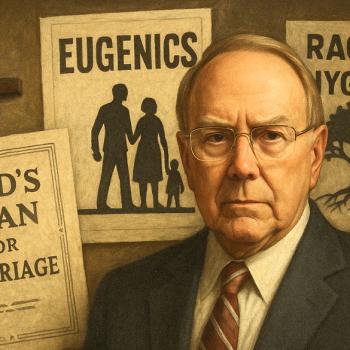What begins to thaw the frosty heart of Ebenezer Scrooge? It's the fact that Marley has acted to help Scrooge. It's a gift of undeserved kindness that first touches Scrooge's soul.
Pastoral Reflections
Undeserved kindness. Theologians call this grace. I don't think it's an exaggeration to say that Marley extended grace to his former partner. In no way did Marley owe Scrooge anything. And there's no reason to believe that Marley stood to gain anything for himself in helping Scrooge, other than, perhaps, the sense of having made a positive difference in Scrooge's life (and afterlife). Moreover, in no way whatsoever had Scrooge done anything to deserve Marley's help. Marley's intervention was simply an act of grace. In fact, it was a demonstration of what theologians call prevenient grace.
Prevenient grace is, simply, grace that comes before anything we do. Prevenient grace takes the initiative. It gets the ball of transformation rolling. The fact that God's grace is prevenient makes all the difference in the world. It means that we cannot do anything to earn God's favor, nor must we. It means that God's favor is given first, and everything we do for good is in some measure a response to that prevenient grace.
Although Dickens was not an enthusiastic Christian - his own faith seemed to be more of a romantic, deistic, Unitarian variety - his anthropology bore much in common with his evangelical contemporaries, of whom he was not particularly fond. According to both Dickens and the evangelicals, human transformation comes as a result of grace, grace that is communicated through a supernatural agent. Of course in the Christian case grace comes from God, not a human ghost, and is delivered through the Holy Spirit, not the spirit of a dead colleague. Jacob Marley doesn't appear in scripture when I last checked. So when it comes to theology, A Christmas Carol isn't especially Christian. But Dickens's understanding of human nature is surprisingly similar to the Christian perspective in some ways. We change in response to grace, with the help of a supernatural spirit.
Though Scrooge's initial experience of grace softens his stony heart just a bit, it hardly transforms it. This arduous task remains for the spirits of Christmas past, present, and future.
.jpg) Mark D. Roberts, as Senior Director and Scholar-in-Residence for Laity Lodge, is an advisor and frequent contributor to TheHighCalling.org. A Presbyterian pastor, Mark earned his Ph.D. in New Testament from Harvard University. He has written six books, including No Holds Barred: Wrestling with God in Prayer (WaterBrook, 2005). This series of reflections on A Christmas Carol were previously posted on his blog, www.markdroberts.com, and are reprinted with permission.
Mark D. Roberts, as Senior Director and Scholar-in-Residence for Laity Lodge, is an advisor and frequent contributor to TheHighCalling.org. A Presbyterian pastor, Mark earned his Ph.D. in New Testament from Harvard University. He has written six books, including No Holds Barred: Wrestling with God in Prayer (WaterBrook, 2005). This series of reflections on A Christmas Carol were previously posted on his blog, www.markdroberts.com, and are reprinted with permission.




